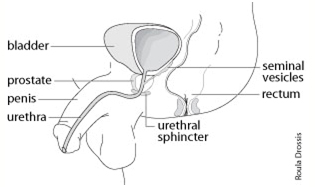
Benign prostatic hyperplasia (BPH) is a common condition in aging men that can affect urination.
The prostate is a gland wrapped around a man's urethra, the urine channel, between the bladder and its control muscle, the urethral sphincter. Its main function is to produce part of the semen ejaculated at male orgasm. Each vas deferens carrying sperm from the testicles connects to the prostate. In young men, the prostate is usually the size of an walnut, however, as men age, it is common for the prostate to grow. This increase in size is called Benign Prostatic Hyperplasia (BPH). This growth may not cause any problems, as only half of men who have it will experience any symptoms. BPH is rare under the age of 40, but present in most men in their 70s and 80s.

BPH is not a cancer. However, a number of diseases, including cancer, can cause similar symptoms. Your doctor may need to do some tests to confirm your diagnosis of BPH.
Your doctor will ask you a number of questions, and may have you fill out a questionnaire about your symptoms to determine how severe and bothersome they are to you. Your prostate will be examined with a gloved, lubricated finger in the rectum (Digital Rectal Exam – DRE) to determine if the prostate is enlarged and if it has any lumps or firmness that might suggest there is cancer in the prostate. You may be asked to provide a urine sample to ensure you do not have an infection or other urinary problem. A PSA (Prostate Specific Antigen) blood test may be suggested to rule out cancer in some men. If the PSA is elevated, it does not necessarily mean that you have prostate cancer, as BPH can also cause the PSA to be elevated. Other tests may be requested in order for your doctor to diagnose BPH and suggest treatment.
The treatment of BPH is determined by the severity and bother of your symptoms. It is also determined by your general health and your personal preference. There are a number of treatment options available. You should discuss these options with your doctor before deciding what is best for you.
in Lifestyle If your symptoms are not too severe or bothersome you may consider this option. This involves periodic assessments by your doctor and making changes in behavior that may improve your symptoms. These changes include:
The use of medication to treat BPH has become popular and is often chosen as the first treatment to try. There are two main types of drugs used to treat BPH and they work in different ways. Sometimes, both medications are taken together.
Alpha blockers (e.g. FlomaxTM, XatralTM, RapafloTM) relax the muscle in and around the prostate and bladder opening to improve urination. Benefit is usually noticed within a few days or weeks and will only last as long as the medication is taken. Side effects occur infrequently and include tiredness, nasal congestion, dizziness and dry orgasm. Some of these side effects go away after a few weeks of taking the medication. These side effects are reversible and will go away once you stop the medication. If you are bothered by these side effects, stop the medication and contact your doctor.
5 alpha reductase inhibitors (ProscarTM, AvodartTM) block the hormones that stimulate the prostate to grow. They are most useful in men with larger prostates. Because it takes some time to shrink the prostate, improvement in urination may not be noticed for several months. If the medication is stopped, the BPH will recur. Side effects occur in less than 10% of men and include a decrease in semen volume, loss of normal sexual desire (libido) and difficulties with erections. This medication is often taken together with an alpha blocker. The combination of these drugs may prevent your symptoms of BPH from getting worse.
Herbal therapies are widely advertised for BPH symptoms and are taken by many men. There is controversy regarding how effective these therapies are for BPH. However, most of them have few side effects. You should let your doctor know if you are taking herbal treatments.
Surgery will be recommended to you if your BPH is causing ongoing urinary retention, kidney problems, recurring infections, or if you are not improving with medical therapy. However, it is also an initial treatment option if your symptoms are quite severe or bothersome. As with any procedure, there are potential complications that must be discussed by your doctor before any decision for surgery is made. There are two main procedures for treating BPH.
Transurethral Resection of the Prostate (TURP) is a common operation done for BPH. It is performed by a us, and we will pass an instrument, under an anesthetic, through the urethra and cores out the prostate. This makes the passage for urine wider. This procedure can be performed with a variety of techniques including using a laser. These techniques may not be available at all centres or hospitals.
Open Prostatectomy is the removal of the inner part of the prostate through an incision in the lower abdomen. It is usually only used for prostates that are too large to remove safely with a TURP. This procedure is quite different from the “radical prostatectomy” done for prostate cancer, where the entire prostate is removed and the two procedures should not be confused.
BPH is a common consequence of men growing older. It can cause inconvenient urinary symptoms and can occasionally affect your health. If symptoms are bothersome, then effective treatment is available. One should discuss these options with one's doctor prior to deciding which treatment is best.